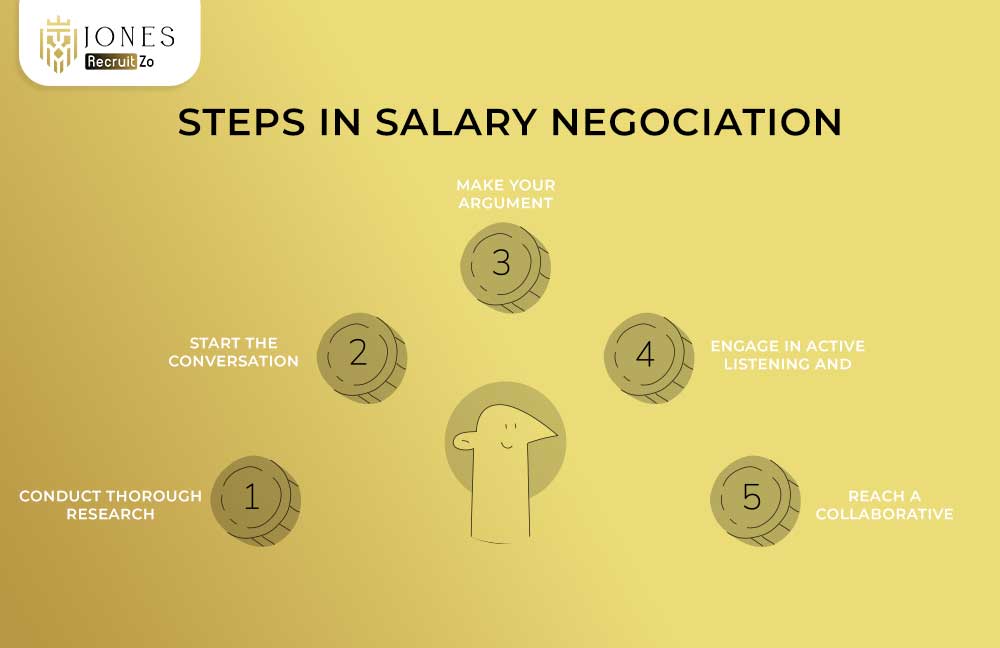How to negotiate salary with hr?
Negotiating salary can feel daunting, especially when you’re eager to land a job or secure a promotion. The thought of discussing money often stirs up anxiety, but it’s a crucial step in advocating for your worth in the workplace. Understanding how to negotiate salary with HR can significantly impact your financial future and job satisfaction. A successful negotiation not only sets the tone for your compensation but also establishes your professional value within the company. This blog will walk you through essential steps, tips, and examples to help you approach salary negotiations with confidence, ensuring you leave the table feeling respected and valued. Whether you’re in the early stages of your career or looking to make a strategic move, mastering this skill is invaluable.
Steps in salary Negotiation
Preparation is key to successfully navigating how to negotiate salary with HR. A well-structured approach can make a significant difference in the outcome of your negotiations. Here’s a detailed breakdown of the steps you should take to ensure you’re fully prepared to make your case.

Conduct Thorough Research
Thorough research is essential to establishing your worth in the job market. Begin by identifying industry standards for the position you’re applying for or the role you currently hold. Utilize online resources such as Glassdoor, PayScale, and LinkedIn Salary to gather data on salary ranges specific to your field and geographical area. If you’re considering how to negotiate salary with HR in India, it’s important to account for local economic factors, demand for specific skills, and typical salary ranges within the industry. Additionally, networking with peers in similar roles can provide insider information and insights that may not be publicly available. This comprehensive research will give you a solid foundation to justify your salary request and demonstrate your understanding of market trends.
Start the Conversation
Initiating the salary negotiation can be intimidating, but it’s an important step in how to do salary negotiation with HR. Begin the conversation by expressing your gratitude for the job offer or opportunity. A positive attitude sets a collaborative tone. For instance, you might say, “Thank you for this offer. I’m really excited about the potential to contribute to the team.” This approach not only showcases your enthusiasm but also opens the door to a more in-depth discussion about compensation. Transition smoothly into the salary discussion by framing it as a mutual conversation, which will help create an environment conducive to negotiation.
Make Your Argument
Making a compelling argument is crucial in the negotiation process. Clearly articulate why you believe you deserve a higher salary based on your research and unique qualifications. Highlight specific skills, experiences, and achievements that make you a valuable asset to the organization. For instance, if you’ve led successful projects or possess specialized skills that align with the company’s needs, emphasize those points. Instead of simply stating a number, explain how you arrived at that figure, referencing your market research and what others in similar roles are earning. This structured approach showcases your preparedness and positions you as a professional who understands their worth.
Engage in Active Listening and Negotiation
Effective negotiation is not just about presenting your case; it also involves active listening. Pay attention to HR’s responses and be prepared to address any concerns they may have. If they express reservations about meeting your salary request, engage in a constructive dialogue to explore their perspective. Ask clarifying questions such as, “What factors contribute to salary decisions within your organization?” This demonstrates your willingness to understand their process and can help you find common ground. Being open to feedback can lead to a more productive negotiation, fostering a sense of collaboration.
Reach a Collaborative Agreement
The ultimate goal of salary negotiation is to reach a mutually beneficial agreement. Focus on creating a win-win situation where both you and the company feel satisfied with the outcome. If HR cannot meet your salary expectations, explore alternative options that might enhance your overall compensation package. This could include bonuses, additional vacation days, or professional development opportunities. Approaching the negotiation with a collaborative mindset not only increases the likelihood of a favorable outcome but also strengthens your relationship with HR, paving the way for future discussions.
Do’s and Don’ts of Salary Negotiations
Navigating salary negotiations effectively requires a careful balance of strategy and professionalism. Understanding the do’s and don’ts can help you approach these discussions with confidence and clarity.

Do’s:
One key strategy is to prepare thoroughly before entering negotiations. Invest time in researching industry standards and company norms to understand what similar roles are paying in your region. Additionally, practicing your pitch with a friend or mentor can refine your argument and boost your confidence. Clear communication is essential, and practice ensures you articulate your thoughts effectively.
Another important do is to maintain professionalism throughout the negotiation process. A respectful and courteous tone fosters goodwill and encourages a collaborative atmosphere. Furthermore, engaging HR in dialogue by asking questions about the salary structure, performance reviews, and opportunities for advancement demonstrates your interest in the role and can provide valuable insights that inform your approach.
Don’ts:
One major pitfall to avoid is accepting the first offer without negotiation. Bringing personal finances into the conversation can also undermine your professional stance; focus instead on your qualifications and the market value of your role.
Another common mistake is adopting an aggressive attitude during negotiations. Approaching the discussion with a spirit of collaboration rather than confrontation can yield better results. Avoid making ultimatums, as this can create tension and lead to a negative impression.
By adhering to these do’s and don’ts, you can navigate salary negotiations with greater confidence and effectiveness, ultimately leading to outcomes that reflect your true value in the workplace.
What Secondary Benefits Can You Ask for in a Salary Negotiation?
When considering how to negotiate salary with HR, it’s important to recognize that salary isn’t the only factor at play. In many cases, companies may have limited flexibility in adjusting salary figures, but they may be open to enhancing your overall compensation package with secondary benefits. Here are some valuable options you might consider requesting.
One beneficial option is to inquire about a bonus structure. Many organizations offer performance bonuses or incentives tied to individual or team achievements. Another appealing request is for flexible work arrangements. Flexibility in hours or the option to work remotely can greatly enhance your work-life balance and overall job satisfaction.
Professional development opportunities are also worth considering. Asking about company-funded courses, workshops, or certifications can demonstrate your commitment to growth and improvement. Additionally, you might discuss the possibility of extra vacation days. Extra days can provide the mental space needed to recharge and return to work more focused and productive.
Finally, inquire about the comprehensiveness of health benefits. Understanding the details of health insurance, retirement plans, and other benefits is crucial. .
By exploring these secondary benefits during salary negotiations, you can create a more comprehensive compensation package that aligns with your personal and professional goals. This holistic approach to negotiations can lead to a more satisfying outcome, even if the base salary remains fixed.
FAQs
1) How do you negotiate salary with HR?
To negotiate salary with HR, start by conducting thorough research to understand industry standards for your role. Initiate the conversation by expressing your gratitude for the job offer or opportunity, then transition into discussing compensation. Clearly articulate your value by referencing your skills and experiences, and be open to dialogue. Active listening is key; engage with HR’s responses and work toward a collaborative agreement that satisfies both parties.
2) What are the Steps in salary Negotiation?
The steps in salary negotiation include:
-
Conducting thorough research to understand market value and compensation trends.
-
Starting the conversation by expressing enthusiasm for the role and transitioning to salary discussions.
-
Making your argument by presenting a clear case for why you deserve a higher salary based on your qualifications and market data.
-
Engaging in active listening to address HR’s concerns and foster a collaborative dialogue.
-
Reaching a collaborative agreement that may involve discussing alternative benefits if salary expectations cannot be met.
3) How do you negotiate salary after receiving a job offer?
After receiving a job offer, express your excitement and gratitude. Begin the negotiation by asking for the opportunity to discuss the compensation package. Present your research on market salaries and explain your rationale for requesting a higher salary or additional benefits. Be respectful and open to feedback, and engage in a dialogue to find a solution that works for both you and the employer.
4) What are the Do’s and Don’ts of Salary Negotiations?
The do’s of salary negotiations include preparing thoroughly, practicing your pitch, maintaining professionalism, being flexible, and asking questions to engage HR. It’s also essential to follow up after the discussion. On the other hand, don’ts include accepting the first offer without negotiation, bringing personal finances into the conversation, adopting an aggressive stance, making ultimatums, and rushing the process. Remember to document any agreements reached for future reference.







